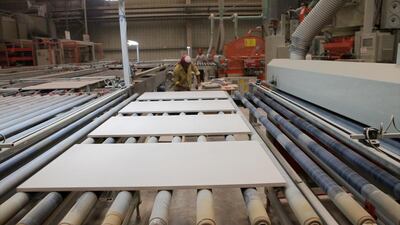RAK Ceramics, one of world’s biggest makers of ceramic tiles and sanitaryware, expects to continue to divest non-core assets and invest about Dh280 million this year as it expands its production in the UAE, India and Bangladesh, its chief executive said.
The Abu Dhabi-listed firm is in the process of selling its Sudan business and its stake in the pharmaceutical company RAK Pharma in Bangladesh as part of efforts to focus on ceramic tiles, sanitaryware, tableware and faucets. The firm expects to receive more than US$50m from the sale of these two assets.
“We are working into several initiatives to enhance the value of the company by concentrating, focusing and adding more capacity in the performing countries and exiting non core [assets],” said the chief executive, Abdallah Massaad. “We have some real estate assets, hospitality business, construction companies and some investments like pharma, which we are selling.”
The Ras Al Khaimah-based firm said profit fell 15 per cent in the third quarter because of hyperinflation accounting in Sudan and Iran. The sale of the Sudan business, which will be concluded by the end of March, will help the company to avoid operational issues regarding the import of raw materials and spares, and prevent further financial losses stemming from hyperinflation and foreign-exchange losses.
The company’s losses in Sudan reached Dh16.4m at the end of September this year. The firm does not plan to sell its Iran business for the time being, the chief executive said.
“We are waiting to see what will happen in the near future [in Iran]. We didn’t take a decision until now,” said Mr Massaad. “The Iranian operation is very small scale because it is not for export. The bulk of the hyperinflation was coming from the Sudan entity and by selling this entity the problem in this case of hyperinflation will be very minimal.”
The company opened a factory in Iran in 2004 with funding from the International Finance Corporation, a World Bank subsidiary that funds private-sector ventures.
The firm expects to invest this year an amount similar to last year’s Dh280m, as the firm wraps up expansions in UAE, India and Bangladesh.
“For sure extra cash will come from selling of the non-core assets,” said Mr Massaad. “We will go first to pay dividends to shareholders, to reduce the debt of the company and to expand [from non-core asset sale proceeds]. We are not expecting to spend more [than last year] because all the expansion we declared we paid off.”
The firm’s net debt was less than Dh1.6 billion, he said, adding that the company was studying all options to fund its long-term plans.
In the UAE, RAK Ceramics will boost its production of sanitaryware by 500,000 pieces from the current 2.7 million pieces in the second half of this year.
There are no plans to boost production of tiles, which currently stands at 81 million square metres. About 70 per cent of the UAE’s production is exported, with Saudi Arabia being the biggest market for tiles and the UK for sanitaryware.
In India and Bangladesh, expansion of the production lines will help to boost supplies to the local market. Current production capacity for tiles in India is 8 million sq m, while production capacity for sanitaryware in India is 700,000 pieces. It will further increase to 1.2 million pieces in the second half of this year.
In Bangladesh, the firm is planning to boost production of both tiles and sanitary ware. Current production capacity for tiles in Bangladesh is 8 million sq metres and it will increase by 21.2 per cent from the third quarter of this year. The current production capacity for sanitaryware in Bangladesh is 1.2 million pieces and will rise to 1.5 million pieces from the first quarter of this year.
“[This year] revenue in UAE will be better, in India will be better, and in Bangladesh will be better,” Mr Massaad added.
RAK Ceramics’ shares closed flat on Thursday.
dsaadi@thenational.ae

